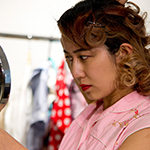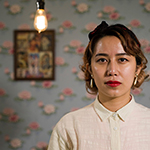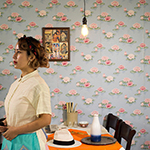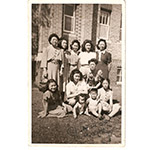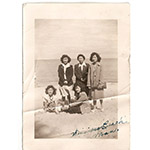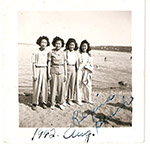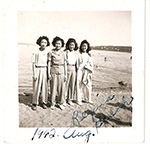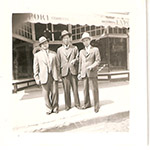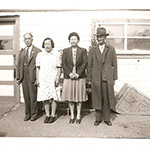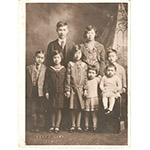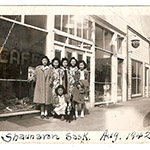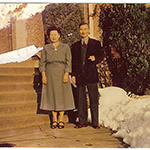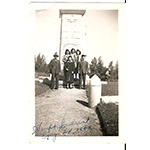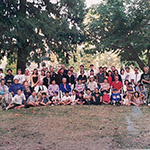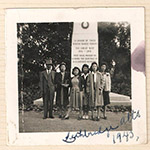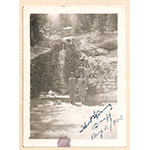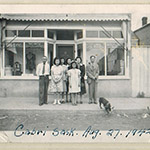Yee Clun and Regina’s "White Women’s Labour Law"
Yee Clun, a Regina restaurant owner, came to prominence in 1924, fighting a Saskatchewan law that required Chinese-Canadians to secure a municipal license to hire "white women" as employees. Public hearings were held that reflected not only the racial prejudices of the time, but also significant support for a well-respected businessman and member of the community. Ultimately, Yee Clun’s request was rejected, but the city’s actions were overturned by the Saskatchewan Court of King’s Bench. In the end, this is a story of racial discrimination, but also of the courage of Yee Clun to challenge the law and of others who stood up for his cause. It is told through public art installed at Regina’s Art Park, located around the corner from Yee Clun’s home and the headquarters of the Chinese Benevolent Association.

Yee Clun's story was previously known among a small circle of Canadian historians, but was little understood either within Regina's Chinese-Canadian community or Yee Clun's own family. Building on research spearheaded by the Saskatchewan History and Folklore Society, the artist Xiao Han developed a photography-based project that was installed in August 2017 in Regina’s Art Park, a site made available by the Heritage Community Association. The installation consists of three large photographs in which Xiao plays the role of various characters important to Yee Clun's story. Her project was aided by support from the Yee family and from an advisory committee, in which the Chinese Cultural Society of Saskatchewan figured prominently. Yee Clun's story and Xiao Han's creative process are told in Kelly-Anne Riess's film, Yee Clun and the Exchange Café.
Credits
Artist
Xiao Han
Xiao Han is originally from China, moving to Canada 2008. This Saskatchewan-based artist received her BFA from Thompson Rivers University in 2013 and her MFA from the University of Saskatchewan in 2016. Han investigates the results of China’s One-Child Policy on her generation, focusing on gender and identity. Using herself as an actor, she performs scenarios of birth control, familial judgment, and psychological disturbance. Xiao’s artwork talk about Politics, gender issues, and also explores crossing cultures between Canada and China based on her experience.
Filmmaker
Kelly-Anne Riess
Kelly-Anne Riess produced and directed the documentary, Finding Al, about notorious gangster Al Capone’s connections to Canada, which aired nationally on CBC in 2016. As part of her work on the project, she was one of only 15 Canadians to receive a grant from the Telefilm Micro-Budget Production Fund for Emerging Filmmakers in 2014. Riess worked as a writer, director and researcher on the TV show Crime Stories, which aired on A&E Biography, Investigation Discovery and History Television. Travelling across North America, Riess interviewed police officers who solved some of the most gruesome serial killer cases in the world. In 2013, Riess won the MTS Stories from Home $20,000 Pitch Competition at the Gimli Film Festival for the documentary Artists by Night, which she produced and directed. The film premiered at the Gimli Film Festival a year later. Riess was a CTV National Fellow at the Banff World Media Festival in 2011. www.kellyanneriess.com
Project leader
Ronald Rudin
Professor of History at Concordia University, Ronald Rudin's role as director of the Lost Stories Project grows directly out of his interest in studying how the past is communicated to the larger public. This interest is evident in his past three books (Founding Fathers; Remembering and Forgetting in Acadie; and Kouchibouguac) which explore how the past has been used for a variety of purposes in French Canada. In addition to communicating his research through text, he has also been involved with a number of film projects which explore the representation of the past in public space. He was the producer of both Life after Île Ste-Croix (2006) and Remembering a Memory (2010); and was the co-creator of the film-based website, Returning the Voices to Kouchibouguac National Park (2013). Having played the lead role in tracking down the story from Western Canada that best suited Lost Stories, he served as project coordinator for this episode.
Making the Art
Historical Images
Teaching Lost StoriesYee Clun and Regina’s "White Women’s Labour Law"
Teaching Lost Stories consists of a set of lesson plans and historical documents that encourage critical thinking about the history that is literally all around us. Teachers and students consider why some stories from the Canadian past have been commemorated through historical markers such as monuments, while other stories have been ignored.
Material prepared by Taytyn Dwernychuk-Welcher, with the support of Kristin Enns-Kavanagh and the Saskatchewan History and Folklore Society.
